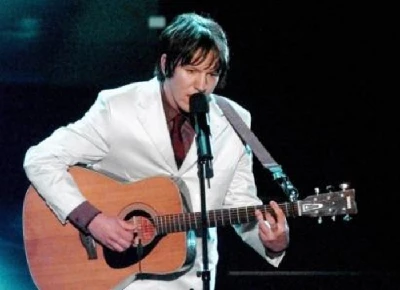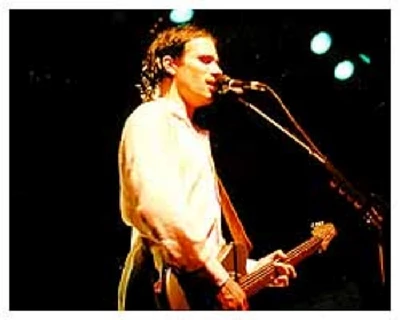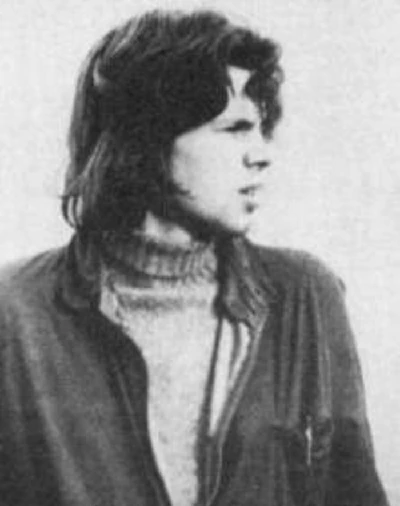Miscellaneous
-
Rise of New Folk
published: 13 /
6 /
2004

The new folk movement has been on the rise for a couple of years. Withartists such as Elliot Smith, Jeff Buckley and Nick Drake popular all over again, and new ones such as Damien Rise in the charts, Mark Rowland profiles the new movement
Article
On October 21st 2003, Elliott Smith stabbed himself through the chest at his home in LA. This was his second attempt to kill himself – he had jumped off a cliff in 1997. Unfortunately, this time he was successful. He suffered heavily from depression, but like all good emotional fuck-ups, had an amazing ability to write beautiful, honest, and emotionally uplifting music.
His five solo albums, 'Roman Candle', 'Elliott Smith', 'Either/Or, XO' and 'Figure 8', were modern folk-rock masterpieces. A big fan of Smith’s work, renowned director Gus Van Sant used five Elliott Smith songs on the soundtrack to 'Good Will Hunting'. One of which, the then-unreleased 'Miss Misery', was nominated for an Oscar. His performance of the song at the 1998 Academy awards brought him to the US public consciousness, but Smith still remained half-way between the underground and mainstream popularity. Tragically, in the wake of his death, this seems to be changing.
The number of Elliott Smith fans that are coming out of the woodwork right now is astonishing. More and more people are discovering his music, much like the gradual increase in popularity of Jeff Buckley after his death in 1997, but another factor could be influencing the sudden rise of Elliott Smith fans – the silent, stealthy invasion of folk music back into the public consciousness.
The rise of new folk music started a couple of years ago and has made progress slowly. It wasn’t until the end of last year that any real sign has been seen that folk music’s popularity is on the rise, when young Irish singer-songwriter Damien Rice’s debut album 'O' slipped its way up the UK album charts without much promotion or media hype.
The same thing seems to be happening to other folk artists and singer/songwriters as well. American Devendra Banhart was almost completely unknown at the beginning of this year. Now he’s appearing on shows such as 'Later with Jools Holland', playing big-ish venues in Europe and his album’s in the recommended section in HMV. Other American singer/songwriters go under strange pseudonyms like Bright Eyes, Dashboard Confessional, Onelinedrawing and Iron and Wine. All of these are very popular in America and their popularity is steadily growing in Britain and Europe.
As well as the new folk artists, old 60's folk artists like Nick Drake are becoming more popular than they were in their heyday. Nick Drake in particular has become much better known, with a compilation of rare and unreleased songs recently released over 30-years after his death.
There are several possible reasons why this folk comeback is happening. It could be put down to the recent revelation that older (mainly male) music fans with high-paid jobs are shaping the album charts more than any other types of people, buying CDs in bulk. These have been labelled in the media as ‘£50 men’ and have definitely made a dent on the shape of the UK album charts, but students and young adults are also getting into stripped down music, so it cannot totally explain the current trend.
It’s also possible that the popularity of blues-y, sixties rock influenced bands such as the White Stripes has opened the door for folk music to get into the mainstream.
There are two likely reasons for the resurrection of folk. One is that since the 60's, folk has always been essentially protest music, an outlet for people to speak their minds about current social issues that are bothering them, and there’s plenty to protest about at the moment – war, the Bush government, the fear of terrorism, to name a few. The second is that people are just getting fed up of over-produced, over-sold, musical money making schemes. We’re saturated by it, with more and more programmes popping up manufacturing pop bands and singers live on television. The music released in the aftermath of these shows is same-y and the ‘talent’ is bland and indistinctive. The same pretty much goes for the pop bands that are put together outside of the ‘instant fame’ shows. This, plus the music industry’s habit of ramming songs down our throats, has driven many people away from mainstream music. They don’t want to be told what to listen to any more, and they want music with substance and real emotion. The internet and MP3 has allowed many to discover music they never would have previously listened to. Sites like epitonic.com specialise in introducing underground artists to more people through brief bios and MP3s.
Although the interest in folk music is a new thing, the cultural shift from soulless pop to music made by real people happens quite regularly. It happened in the mid-60's, it happened when punk broke in 1977, it happened in the early 90's with Nirvana and grunge and it seems to be happening now. Of course, the crap pop won’t go away, but it will find itself losing sales to music that someone could create in their bedroom with a battered guitar, a few chords and something to sing about.
It’s unlikely that this shift will last very long. Eventually, the music industry will catch on and sell acoustic music until people lose interest, if folk continues to rise in popularity. At the moment it hasn’t quite exploded into the mainstream and it might not. It could just miss out on becoming the next big musical movement, which to be honest may not be a bad thing. There is one thing that’s pretty certain, however: if Elliott Smith’s part-finished sixth album, 'From a Basement on the Hill', is released in its present state, it’ll probably sell like hotcakes on both sides of the pond.
Picture Gallery:-

